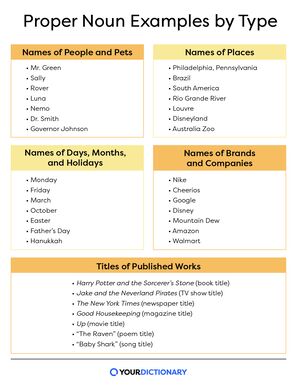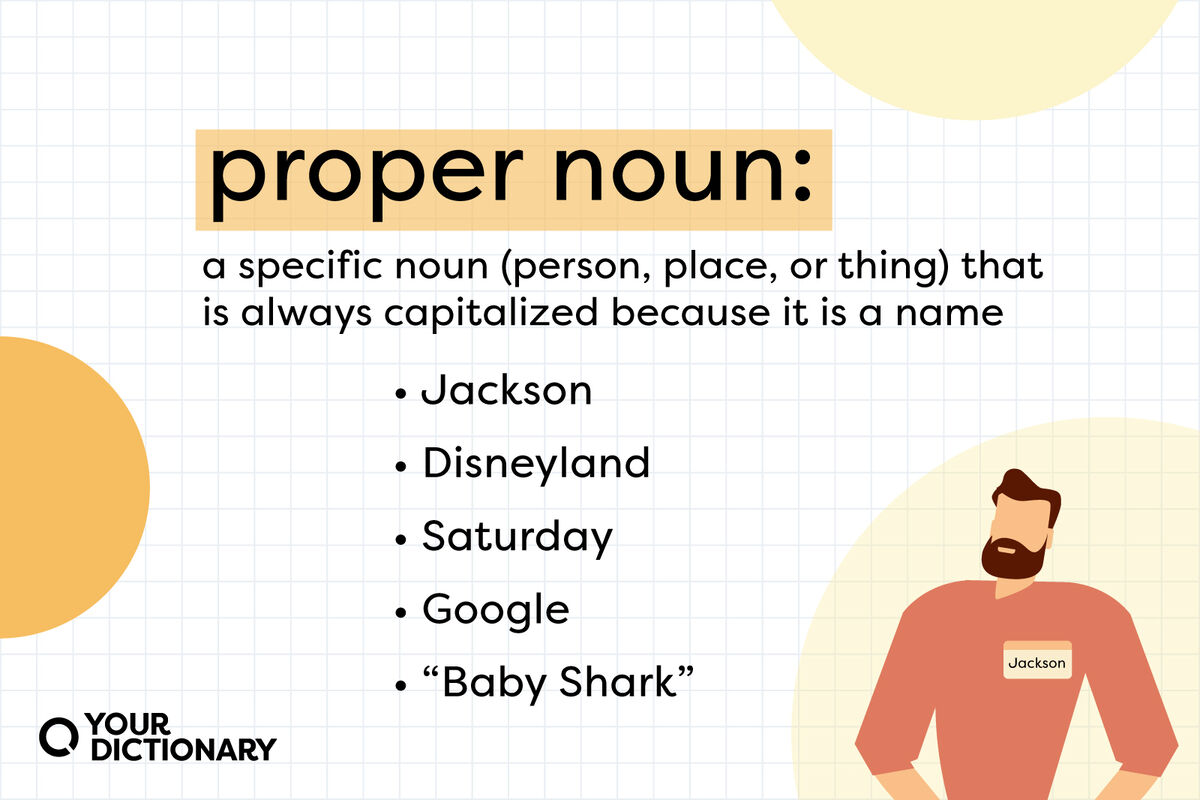

A proper noun doesn’t need a top hat or a monocle to be proper. In fact, proper nouns don’t need to be fancy at all — they just need to be specific. Antarctica, Martha Washington, Tesla, and Maple Street are all proper nouns, and not because they’re fancy (no disrespect to Mrs. Washington, who was probably quite fancy).
What Is a Proper Noun?
A proper noun is a specific noun (a person, place, or thing) instead of a general noun. That’s why they’re always capitalized, no matter where they fall in a sentence — they’re naming that specific noun.
Proper nouns are usually singular, not plural, since they’re talking about one specific noun.
- Have you asked Louis about the lunch order?
- I’ve never visited New York in the winter.
- My dog, Caroline, doesn’t like thunderstorms.
- The kids ate all the Oreos.
Common nouns, on the other hand, aren’t capitalized. They’re general, not specific. In “The kids ate all the Oreos,” for example, you could replace the proper noun Oreo with the common noun cookies — not specific, not capitalized.
Examples of Proper Nouns for People and Pets
The first, middle, and last names of people and pets are always proper nouns. If you use a title in front of their name (such as Mrs. or President,) it should also be capitalized.
- Jennifer and Jackson took their dog Bailey for a walk.
- I hope Mrs. Smith is my teacher next year.
- My favorite cartoon character is Bart Simpson.
- When is Dr. Kenneth returning to the office?
- Please let Governor Jimenez know I’m here.
- Let’s get cupcakes for Maribel’s birthday party.
Examples of Proper Nouns for Places
The specific names of places, such as streets, cities, states, countries, museums, amusement parks, or zoos are proper nouns. When you’re talking about a specific geographic landmark, that’s a proper noun as well.
(Notice that some proper nouns use the definite article the before their name; unless it’s an official part of their name, the isn’t capitalized.)
- Have you ever been to Philadelphia, Pennsylvania?
- Brazil is the largest country in South America.
- We saw the Rio Grande River on our road trip.
- I want to see the Louvre at some point during our visit to Paris.
- Did you get tickets for Disneyland yet?
- I expected more kangaroos at the Australia Zoo.
Examples of Proper Nouns for Days, Months, and Holidays
The days of the week, the names of months, and the official names of holidays are all proper nouns. However, the words week, month, and holiday are not.
- I have to work on Tuesday.
- This Saturday is the fourth.
- Come to my house in July for the party.
- Is your birthday in the month of December?
- I love Christmas more than Halloween.
- What are your plans for Friday?
Examples of Proper Nouns for Brands and Companies
Brand names are proper nouns because they represent a company name or a distinct product. If you didn’t capitalize them, they would no longer represent their product. (A Cheerio makes sense, but what is a cheerio?)
- I’m saving up for new Nikes.
- Jacques found the correct phone number on Google.
- Every art student dreams of working at Disney.
- Do you know how much caffeine is in a bottle of Mountain Dew?
- That Toyota almost ran a red light.
- Did you bring your Nintendo to the sleepover?
Examples of Proper Nouns for Published Works
The titles of books, magazines, newspapers, movies, TV shows, songs, and plays are all proper nouns. For longer titles, only the most important words in the title are capitalized. Prepositions and articles are not capitalized unless they are the first word.
- Harry Potter and the Sorcerer’s Stone (book title)
- Jake and the Neverland Pirates (TV show title)
- The New York Times (newspaper title)
- Up (movie title)
- “Baby Shark” (song title)
Examples of Proper Nouns Chart
Keep this proper nouns chart handy as a reference, reminding you of all the different types of proper nouns out there.

More Proper Noun Examples
Other types of nouns that are proper (and should be capitalized) include:
- schools - Oxford University, Auburn University
- religions/faiths - Catholic, Islam, Hindu, God
- course names - Economics 101, Child Psychology in America, Shakespeare's Comedies
- historical periods/events - World War I, the Renaissance, D-Day
- languages/nationalities - French, English, German, American
Common Proper Noun Mistakes
There are a few tricky situations to consider when it comes to proper noun capitalization.
- seasons - While days and months are capitalized, seasons are not. Avoid capitalizing spring, summer, fall, and winter.
- general subjects/courses - While you would capitalize Chemistry 101, you would not capitalize the word chemistry in general usage, such as “I am studying chemistry.”
- celestial and lunar terms - The words sun and moon are generally not capitalized in sentences unless they are a part of a list of other astronomical names.
- general titles - When titles are part of the name, they are capitalized, but they are not capitalized when discussed generally. For example, "The president of China will be in Washington D.C. next week to visit with President Obama."
Are Family Names Proper Nouns?
Writers are sometimes confused when it comes to capitalizing family names, such as dad or grandma. Are they proper nouns?
Like all proper nouns, family names are capitalized when you’re using them as names. You’re referring to them as specific people.
- Dad says I can't borrow the car tonight.
- Please set another place at the table for Grandma.
- When is Mom coming home?
However, they’re common nouns when you add determiners, such as my or your, in front of them. There’s no capitalization needed in these cases, even though you’re still referring to the same person.
- My dad says I can’t borrow the car tonight.
- Please set another place at the table for your grandma.
- When is my mom coming home?